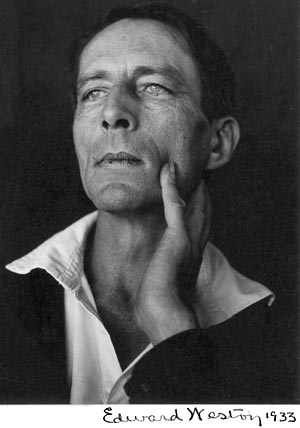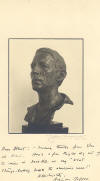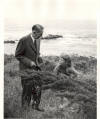|

A 1933 Edward Weston Photo
of Jeffers from the Oxy Jeffers Collection
Occidental College
has a fine collection of Jeffers letters,
manuscripts, books and
pictures.
This website is a
virtual gallery of Jeffers work and other rare
items from the collection.
Jeffers at
Occidental College
The Poetry
Jeffers'
Fascinating Friends and Family
The
Controversial Life of the Poet
Organizations
Dedicated to the Man and his Poetry
Other
Online Exhibits
|
The
Life of the Poet & the Controversy that Surrounded
Him
There are a few online biographies of Robinson
Jeffers, including a good one at The Academy of
American Poets. But
the best way to explore the life of Robinson Jeffers
is through the work of scholars and admirers who have
dedicated their lives to researching the poet. Dozens
of biographies and critical examinations of the
life and work of Jeffers have been published. Notable
volumes are:
Robinson Jeffers:
The Man and His Work by Lawrence Clark Powell
Robinson Jeffers: The Man and the
Artist by George Sterling
The Stone Mason of Tor House by
Melba Berry Bennett
These books were all written during Jeffers
lifetime and are still valuable resources for
understanding Jeffers' life and poetry. The first was
written as a doctoral dissertation by Occidental
College alumnus L.C. Powell. George Sterling's book
launched Jeffers career as a popular poet. This book
represented the passing of the unofficial position of
California's leading poet from Sterling to the young
Jeffers. Melba Berry Bennett, author of the third
book, was Jeffers' secretary and friend. She produced
two volumes about the poet. In order to better
understand the poet and his art, one must also study
him from a distance. The aforementioned books are
valuable for their intimate descriptions of Jeffers,
but the best resources for a critical
understanding of Jeffers poetry and lifestyle were
published later, with a more developed understanding
of the social, political and literary context of his
work. Works by James Karmen, Robert Brophy, Tim Hunt
and Alex Vardamis are the foundation of the field of
Jeffers studies. For a thoroughly enjoyable read and
an exciting introduction to Robinson Jeffers, however
biased in favor of the poet, the works of William
Everson (Brother Antoninous) offer creative, original
and engaging insight on Jeffers' life and poetry.
Background: Drawing by friend of Jeffers and former Occidental President Remsen
Bird
|
Images from his life

Bust of the Poet With
a Goofy Inscription

Jeffers with his
granddaughter

Jeffers
the Stone Mason
|

